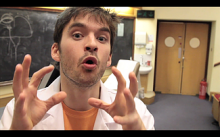Why Do We Dream?
(Inside Science) -- Why do we dream? Sigmund Freud said dreams are the hallucinatory fulfilment of an oppressed infantile wish. Well, that was 100 years ago -- how do we think about dreams now?We can describe dreams as vivid, sensorimotor hallucinatory experiences. Now, think back through your own dreams. They share common features. They have a narrative. They generally involve other people. And those people are often hostile. Dreams are always shaped by our own individual experiences and memories. But how can we actually learn about them?
First, you need to find someone who is dreaming. But, you can’t just ask a sleeping person to tell you whether they’re dreaming or not, without stopping them from dreaming. But you can do something almost as good. There is a stage in the sleep cycle called rapid eye movement sleep, or REM sleep. During REM sleep, nine out of 10 people report dreaming. So, researchers often use REM sleep as a signal that someone is dreaming. Those flickering eye movements have even been suggested to correspond to scene changes during dreams.
Now, this might seem a little counterintuitive, but during REM dreaming, we’re conscious, but in a wonderfully strange way. It’s because of the neurotransmitters being released into our brain. When we’re fully awake, we have acetylcholine, serotonin and noradrenalin sloshing around up there. But, during REM dreaming there’s only acetylcholine. Acetylcholine can trigger the activity between our thalamus and our cortex that makes us conscious. But without serotonin and noradrenalin, we’re not actually awake -- we’re caught in dream consciousness.
In this state we see vivid, hallucinatory dreamscapes that are generated by activity in high level parts of the visual cortex. Vast areas of the emotion processing regions, the limbic system, are also alive; in fact, emotional processes are more active during REM sleep than when we’re awake. And on top of that, the area that focuses attention and imposes top down logical thinking is strongly deactivated. So, our dreams can become hyperemotional. It’s even suggested that dreaming helps us process emotional events in our lives. There is study that found that people going through a divorce had worse dreams but were actually in a better emotional state a year later.
Maybe the most popular theory for why we dream is that it helps us lay down memories. There are experiments that support this view and the brain’s memory encoding system is active during sleep. But, if this theory is true, then we need to deprive people of REM sleep -- then they should have worse memories, right? Wrong. Antidepressants decrease REM sleep and dreaming, but in some cases they actually improve memory. So, memory formation is unlikely to be the whole purpose of dreaming.
One thing that is clear from all of this, is that sleeping and dreaming are very active processes. And much more akin to wakefulness than we might think.
In fact, when this video is finished, just let your mind wander for a spell. Although you’re awake, you’ll end up activating the same specific brain network that’s activated when you dream.

